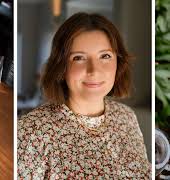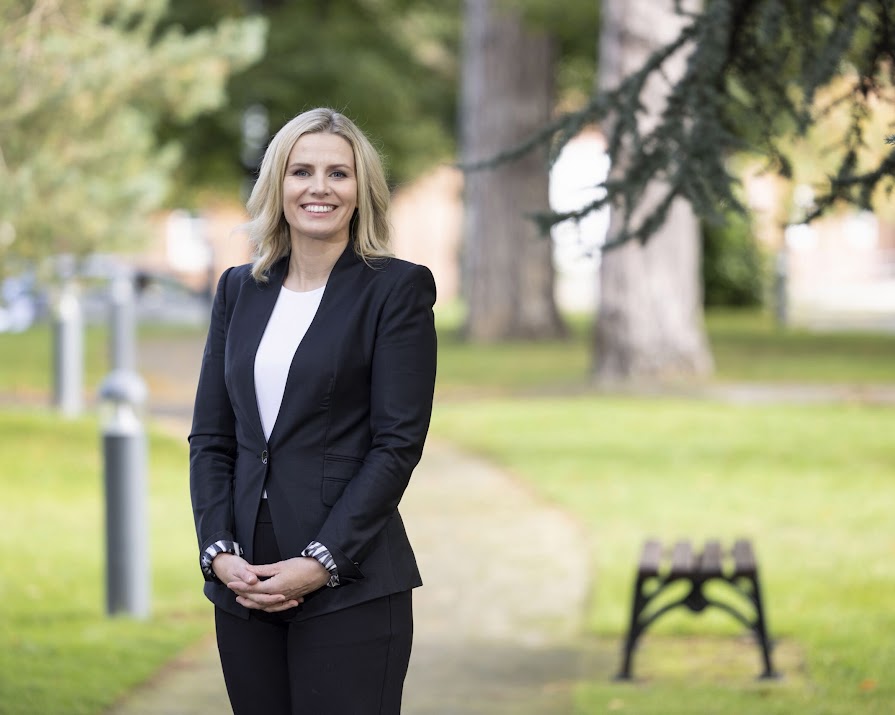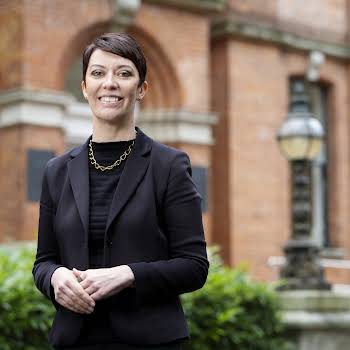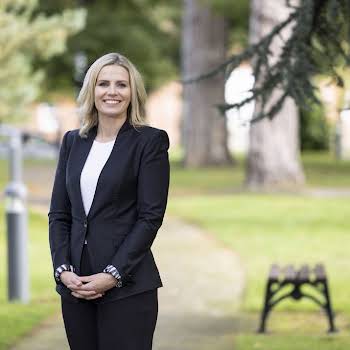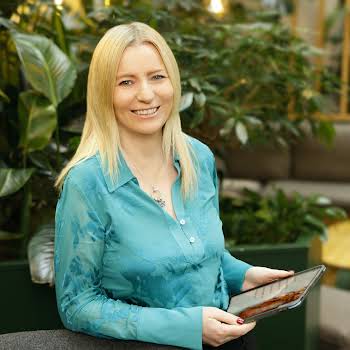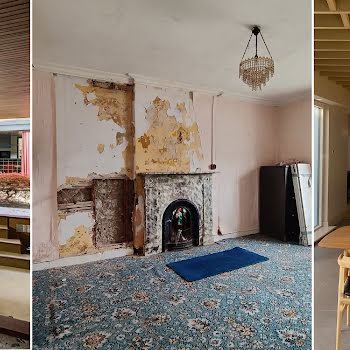
Sponsored
IMAGE Smurfit Scholar Sharon McManus on why an MBA is the next step in her groundbreaking career
Sponsored By

By Megan Burns
17th Dec 2023
17th Dec 2023
Sponsored By

Military lead for capability development planning in the Irish Defence Forces and current IMAGE Smurfit Scholar, Sharon McManus, shares how the Modular Executive MBA is setting her up to take the next steps in her career. Her impressive career to date has seen her climb the ranks in the Irish Defence Forces and work with the Department of Defence and European Defence Agency.
For the last 15 years, IMAGE Media has been proud to partner with UCD Michael Smurfit Graduate Business School to offer one female candidate a 100% scholarship to join the Full-Time MBA or Executive MBA.
This year’s scholar is Sharon McManus, who is undertaking the Executive MBA. Currently military lead for capability development planning in the Irish Defence Forces, Sharon has had an illustrious career to date, including work with the Department of Defence and European Defence Agency, and also becoming the first woman in the Irish Defence Forces to be promoted to the rank of Lieutenant Colonel in a STEM role.

With so many successes under her belt, she has set her sights on her next challenge. While she has vast experience in functional roles, she’s hoping the MBA will help her move into more organisational leadership roles.
Advertisement
It’s just the latest step in what has been a lifetime of learning and challenging herself. She was initially attracted to the Defence Forces, she explains, as a slightly different route in life, and applied to an Officer Cadetship after completing her Leaving Certificate. “I was always interested in adventure and the outdoors. I suppose I had certain leadership qualities, and I saw it as a challenge, which inspired me.”
After being commissioned into the Artillery Corps and studying Civil Engineering at NUI Galway, she transferred to the Army Corps of Engineers. “This was what I see as the pivotal start of my career,” Sharon explains. “The Corps of Engineers is hugely interesting, varied and rewarding work, which spans combat engineering, which is to ensure that infantry troops can move, that they have roads and bridges and clear routes to move in, and also to cut off routes in certain situations. This is known as mobility and counter mobility. Our other combat role is survivability, which is to develop, build and maintain deployed camps overseas in very austere, remote locations. That includes designing and building camps; security; drilling for, producing and purifying water for troops to drink; generating our own electricity and managing its distribution around the camp.”
“On one of my overseas trips to Liberia in East Africa in 2005, I was responsible for producing these life support elements in a camp. The heat was so extreme; it was up to almost 50 degrees, and I noticed how it created a lot of pressure on the electrical generation systems and on us as engineers to ensure that the constant supply of electricity was maintained in these climatic conditions.
“Six months later, I found myself in Kosovo in Eastern Europe, where it was minus 20 degrees at one point. The extreme cold had equally dramatic effects on our ability to generate electricity but in a slightly different way. Also, the local communities were subject to the national grid outages; they had specific time periods where they would have access to electricity. So energy management and generation and the complexities of that really interested me. I was a civil engineer, but I really wanted to know more about this mechanical and electrical aspect. So when I returned from Kosovo, I decided to do a master’s in Sustainable Energy Engineering in UCC.”

The work she completed as part of the master’s led the director of the Corps of Engineers to ask Sharon to lead the development of the energy management strategy for the defence forces. “We established a new way of working in terms of energy management, waste management and sustainability,” she says. “We implemented a new energy management system, created new data gathering models and methodologies, and then used that data to create a pathway to energy efficiency, as well as starting a programme of replacing our conventional energy sources with renewable energy.” This resulted in Ireland becoming the first Defence Force in the World to achieve an ISO 50001 International Energy Management Standard.
Her success brought her to the attention of the European Defence Agency, and in 2015 she was appointed as their energy and environment project officer. She worked for two and a half years in Brussels where she implemented strategic research agendas into new and alternative types of energy technologies that could be used to offset operational energy across land, sea and air platforms. Another aspect of the work was to implement training education, awareness and education on energy management systems for other European armed forces.
Advertisement
Sharon also led the EU Commission’s Armed Forces Consultation Forum on Sustainable Energy in the Defence and Security Sector. “This was the first time that a defence project had been funded by the European Commission,” she explains. “So it was quite groundbreaking. We were able to engage all European member states and EEA countries to create what we called a defence energy network, which is still thriving to this day, encouraging armed forces of Europe to embrace the European energy and renewable energy directives, protect critical energy infrastructure and most importantly unlock funding mechanisms now for energy research and development.”
As an officer in the defence forces, you’re a leader, and you’re expected to find a way around problems or challenges. So, it’s in our DNA. I am an analytical but also a conceptual thinker, and I am not afraid to challenge the status quo or to see if we could do something a little bit better or more efficiently.
“The work in the EDA introduced me to capability development and innovation management techniques,” Sharon explains, “and when I returned from Brussels I advocated for the creation of a Research, Technology and Innovation unit to be established across the Defence Forces and Department of Defence. Together with my Department of Defence colleague, we developed the feasibility study to accomplish this and the new unit was established in early 2021.”
While completing a master’s in Leadership, Management & Defence Studies in the Irish Defence Forces military college and NUIM in 2021, Sharon’s thesis analysed how to create a capability development planning process, and she was asked to work with the Department of Defence to develop the process and structures for such a unit, which she did in 2022. This unit has now been established and work is beginning as part of wider Defence Forces transformational work.
It’s a career that proves Sharon’s aptitude for charting new ground and creating systems and structures that haven’t existed before. “As an officer in the defence forces,” she says, “you’re a leader, and you’re expected to find a way around problems or challenges. So, it’s in our DNA. I am an analytical but also a conceptual thinker, and I am not afraid to challenge the status quo or to see if we could do something a little bit better or more efficiently.”
Advertisement
And as one of few women in her field, her success is perhaps even more impressive. Although only around 7% of the defence forces are female, with even fewer in STEM roles, Sharon says she has always felt supported throughout her career. “I’ve received nothing but encouragement and opportunities.”

It’s this drive that inspired her to apply for the UCD Michael Smurfit Business School MBA, as well as a constant desire to learn something new and push herself forward. “I love new concepts, and I suppose because I’ve always been at the nascent, early adopter stage of new developments in the defence forces, you really need to learn what the best practice is. So academia is an amazing opportunity to do that.”
Completing the MBA part-time alongside her job, she says, has been incredibly helpful for making immediate connections between what she’s learning and her day-to-day work. She says a perhaps surprising aspect of the MBA has been the opportunity for strategic reflection. “It’s a really good opportunity to take a breath and think about how you’re doing things. Something that put me off doing this for years was that it would be too time-consuming, but in actual fact, it gives you space for that reflection. I have three children and live in Galway – if I can do it, anybody can.”
Making this time commitment, Sharon says that she knew she wanted to go to UCD Smurfit School. “It has the reputation of being the best and if I’m going to invest my time, which is quite precious, I want to get the most that I can out of it. The network that UCD Smurfit School provides has already paid dividends, my class colleagues are inspiring and the standard of teaching provides such a rich learning experience. The organisational behaviour module and leadership module were particularly interesting, because I’ve spent most of my career in leadership and management roles and would consider myself an experienced and effective leader, but you’re never finished learning. I found the lecturer for that module particularly effective and inspiring and learned an awful lot about organisational behaviour that I’m able to implement immediately in my role.”
Sharon says the scholarship was a real push to take the leap to do the course. “As women, we are subject to family and societal pressures… I’ve had a lot of support over my career, but you do have to rise above that subliminal pressure that might be there. And I think achieving a scholarship helps quieten that doubt.”
Another element that helped her make her decision was her first overseas posting since she had children, when she went to Lebanon for four months in 2021. “Parents can often feel a lot of worry and guilt about those types of deployments. What I learned during that period was that the hardest part is deciding to go. Once you’ve made that decision, and you know that you have your support mechanisms in place at home, the experience is very rewarding.
Advertisement
“And when you come back, you’re so proud of yourself. Often it’s a psychological blocker that prevents you from doing these things. I’ve learned from that experience, so when I was applying for the MBA it’s those same kinds of pressures, but because I had learned from that I was able to say, ultimately, I know I can do this. I’d love other women who might be doubting their ability to juggle the complexities of their lives to know that the MBA is not as onerous as you might think. I hope to keep learning and challenging myself and contributing to defence and security, energy security and other challenges for as long as possible.”
IMAGE MBA Scholarship
IMAGE has partnered with UCD Smurfit School for the last 16 years to offer one female candidate a 100% scholarship to join the Full-Time MBA or Executive MBA programme. This year’s successful candidate will commence in August 2024.
The scholarship is open to all successful female applicants for the MBA who are resident in Ireland. The closing date for applications is April 30, 2024. To find out more and apply, click here.
Learn more about MBA programme options at smurfitschool.ie








